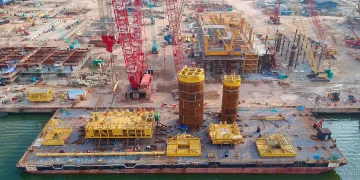Why BP Supports a Fast Transition to Low Carbon
The wide and growing concerns about climate change will be clearly visible in Aberdeen today at the BP annual general meeting. We at BP understand these worries and share them. That is why I was pleased to take on the chairmanship earlier this year to support the transformation being led by chief executive Bob Dudley and his team.
Activist groups are expected to gather outside the city’s exhibition centre, and two groups of investors inside the hall will propose climaterelated resolutions. We will urge shareholders to back the resolution proposed by Climate Action 100+ which calls for greater transparency from BP to show how our strategy is consistent with the goals of the 2015 Paris agreement on climate change.
Some might ask if that is at odds with the interests of the majority of our shareholders. With the oil price above $70 a barrel for Brent crude, surely BP wants to keep producing and selling as much as it can for as long as it can.
On the contrary. We recognise that the world is on an unsustainable path. We believe our strategy is consistent with Paris. And we welcome steps, such as this resolution, that are supportive of a faster transition to a low carbon energy system.
To be absolutely clear on our view: BP believes that the findings of climate scientists are real, as such it follows that the world needs to move to net-zero carbon emissions
in the decades to come. The only uncertainty lies in the pace and nature of the energy transition.
That is why we cannot support a second resolution proposed by a group called Follow This, which includes targets for emissions over which BP has no control. This does not allow for flexibility and would restrict our ability to transform in response to the uncertain path the transition will take.
An accelerated transition as envisaged by the Paris agreement would be a significant challenge for oil and gas supermajors. Our evolution into broader energy companies would require us to create new carbon neutral businesses at an unprecedented rate and to transform existing businesses.
But consider the alternative. The longer carbon emissions continue to rise, the harder this change becomes, requiring a more painful transition for us and the world. The world can’t continue along its current path.
Running a large multinational company in such an unstable environment would become increasingly difficult: how could we plan and develop strategies for the future knowing at some point the world will have radically to change course, but not knowing when or how?
So, however challenging a fast-paced transition might be, it is the best option for BP and our shareholders — just as it is for the whole world.
We are therefore committed to playing our part in advancing this transition, however challenging. We have transformed many times over as the global energy system has evolved and are in the process of doing so again.
But this time no company can do it on its own. Success will require new levels of collaboration across industry, consumers and governments, aided by technology improvements and well designed government policies.
Most importantly, we must accelerate development of clear, stable carbon pricing systems first nationally and in time connected globally.
Equally, a company such as BP, with responsibility for its shareholders’ investments, cannot be expected to get out alone in front of that transition. Arguably, we did so 20 years or so ago in the era of Beyond Petroleum. We invested heavily in renewables, developing sustainable businesses in wind and biofuels. But we also lost a lot of shareholder money as governments and society responded more slowly than we had anticipated.
One important lesson we took from that period is that the world needs companies like BP to remain financially strong.
Much more energy is being demanded to improve the lives of billions of people around the globe. At the same time, a huge re-engineering of the energy system must take place to deliver that energy with dramatically lower emissions.
With our knowhow, relationships and capabilities, companies like BP need to be part of the solution. And we really want a fast-paced transition to a lower carbon energy system.
We say this not to protect our licence to operate, or as some form of elaborate greenwashing. Apart from being the right thing to do, it is simply in our own best interests.
Helge Lund
The writer is the chairman of BP







